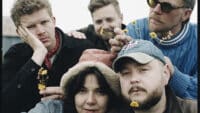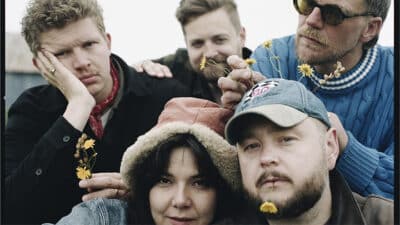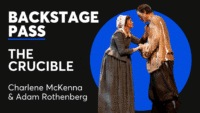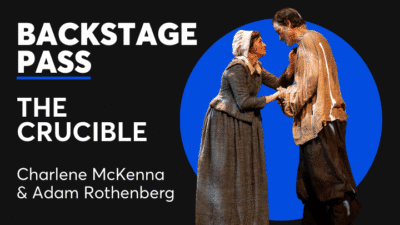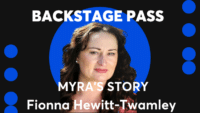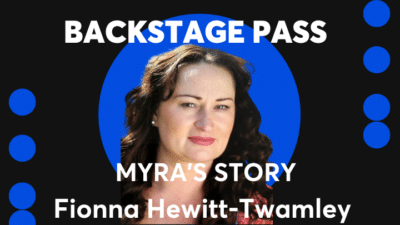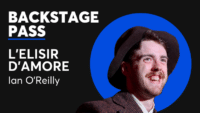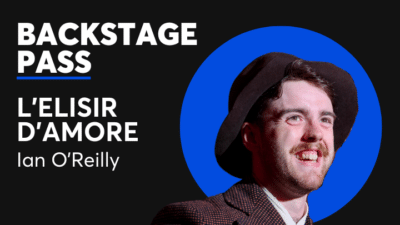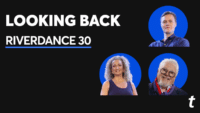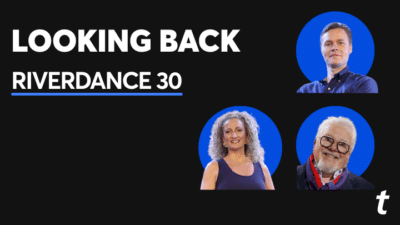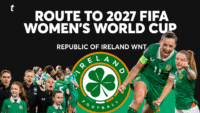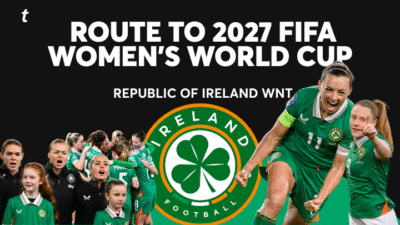Music
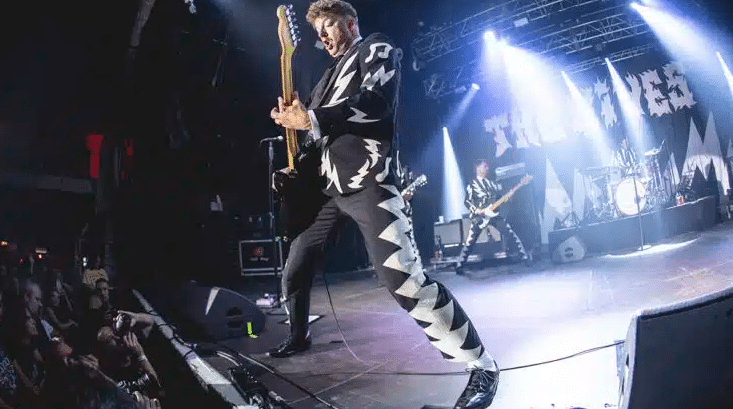
Interview
Stage Times: The Hives
The Hives’ lead guitarist Nicholaus Arson talks us through his gig memories, from school talent shows and Swedish punk clubs to Reading & Leeds festival
If Randy Fitzsimmons is dead, who are we talking to? According to The Hives, Fitzsimmons is the band’s sixth member: a mysterious mastermind who wrote all of their songs before disappearing a few years ago, burying the tapes for a new album in an unmarked Swedish grave and setting clues for the rest of the band to follow via an obituary in a local newspaper. According to everyone else, Randy Fitzsimmons is all made up: another pseudonym for lead guitarist Niklas Almqvist (aka “Nicholaus Arson”), who absolutely denies it.
Talking to Almqvist is just as baffling. Open and honest about the three decades he’s spent leading one of the most kinetic live bands of the post-punk revival with his brother, Howlin’ Pelle Almqvist, but weirdly cryptic about any mention of “Randy”.
“The last eleven years have passed both really slowly and really f*cking fast,” he laughs, looking back to the last Hives record in 2012. “I think we hit a bit of a lull, I guess. I don’t know, maybe we were both a little bit tired? And then, of course, there was no communication with our sixth guy…”.
Whether or not Randy Fitzsimmons buried a load of new songs in a cemetery or Almqvist just wrote them and then pretended he didn’t, The Hives have another record coming out – with the ferocious, old-school garage rock of The Death Of Randy Fitzsimmons set to remind everyone what The Hives are capable of.
“In terms of energy, I think it’s only really rivalled by the Barely Legal record we put out in 1997,” Almqvist says through a thick Swedish accent. “It’s something we do really well – these kind of fast-paced punk songs – and I think we’re leaders in our field, in a way. This record is almost a nod to what we were doing before, but then I guess we’ve always done that.”
Slightly Less bombastic than his brother (who didn’t mess around in a Rolling Stone interview when asked about always making the same kind of music: “Sharks have been the same for billions of years, and they still rule…”), Almqvist clearly has a more complicated relationship with The Hives’ musical evolution.
“I once read a Little Richard biography and he was talking about how he didn’t want to become a novelty act. He was saying that in 1964 or something, back when touring for 10 years was considered a long time… And then the Beatles came around and kind of tried to steal his sound, and to him, he was just another novelty act. And that’s kind of what it feels like when you’re constantly going around playing all your old stuff, even though we love our old stuff. I mean, it kind of feels wrong. If you don’t make new records, you’re only doing half the job of what a rock band should be doing.
“Making records and touring are equally important, and if you’re only doing one of them, you’re doing something wrong. So I think we were doing something wrong for a long time. But then, you know, we found Randy’s tapes and that’s when we could start working again…”
With The Hives now set for a major UK and Ireland tour in spring 2024, we asked Almqvist to walk us back through the gigs that defined him. And Nicholaus Arson. And Randy Fitzsimmons…
The One That Made You Want To Play Music
I started out listening to music when I was pretty young. I was probably five or six when my dad introduced me rock ‘n’ roll. But there was an older kid too, maybe four years my senior, and he lived on the same street. When I was about six, he was about 10, and he had For Those About To Rock… by AC/DC. It just looked really, really cool. It was this bronze record with a cannon on it. And then it opens with that title track, with all the guns going off, and it kind of blew my mind. He taped it for me on cassette and I listened to it all the time. And then we formed a little band, and that’s kind of how it all started.
But for live shows, that’s harder. My dad used to put on jazz shows in our hometown, we we always had bands staying in our basement. I mean, I knew it wasn’t rock ‘n’ roll, because I could kind of hear that it was something else, but the instruments were the same. The drums looked like drums. The guitars looked like guitars. So I just kind of soaked it all up. Dad was a subscriber to Guitar Player magazine too, so these magazines would turn up once a month with pictures of Angus Young or Judas Priest or Iron Maiden on the cover. Around that time I think Pelle went to a punk show in our hometown with dad – we had a one-day festival with a lot of American and English punk bands – but for me, it was probably a school show.
At the end of the term before Christmas we used to have a school talent show where you could do whatever you wanted. I remember some of the older guys put on a little punk gig. The rest of us became the crowd, all pogoing and stage diving and stuff. I think being a part of that crowd is what kind of started it for me. I realised then I could either be part of the crowd, or I could be part of the band. Simple as that.
The First
It was probably soon after actually. We had a sort activity house run by the church in my hometown – I don’t know if that’s a thing outside of Sweden – but we kind of started doing our first shows there. This was pretty early on, when I was maybe about 13 or 14. Literally as soon as we had a band we would do shows, and I think the first gigs were all at that church place. It would be the same crowd every time, just friends of ours who were all the same age. And it was really just like, “Oh, these guys have a band, can we be the crowd?”. And then they would all know exactly what to do to make it feel real.
That activity centre was also where we would rehearse. Mainly because they had proper instruments. The stuff that we had in our house was all broken stuff that we sort of taped together.
The Smallest
There’s been quite a few of those. I remember once we played in Germany in front of nine people and a dog. It was a small show, but I’m still pretty sure the room was a lot bigger than that. We’ve played a lot of really small rooms. There was some boat in France once too, where we had to sort of climb down a hatch to get onto the stage.
The thing is though, I want all the stages for The Hives. The little weird ones, the sweaty clubs, the big stages, the stadiums.
I remember when we released the first record we used to do shows in this place called Kafé 44. It’s kind of a classic Youth Centre in Stockholm where bands would go and play in the basement, and they would put on a lot of American hardcore there. We’d go there to see shows, and then we got to play there. We went back again for the last Hives record and we did a set of matinee shows there. So that was full of kids, like 14, 15 and 16-year-old punks, and we would play a set, empty the room, bring in another batch of kids, and then do another one. Over and over, all sweaty. That room holds maybe 100 people at most. But those kids would just go completely nuts. They were all pushed against the stage, just by force, and we’d kind of fall over on them and they’d push us back up and it was like we were knee-deep in teenage punks, which was a pretty great feeling. I want that feeling all the time.
The Biggest
That was probably one of the times we were at Reading & Leeds. But I mean, it quickly goes into trying to do the same thing. You want to sort of create an atmosphere and you want to make sure that it’s a proper show. I just remember that it was a much bigger area to cover on the stage. You’d move away from your mic and be like, “sh*t, I gotta run to make it back before the chorus!”.
When there’s 30 metres between you and the crowd, it does feel different. The connection that you have with the crowd is so much faster in the small rooms. People get your jokes all the time. The banter works. We can be faster going into songs. I guess you sort of have to dumb it down a little bit for the big arenas. But again, I want them both. I want the tiny room and I want the big stage, and I want whatever’s in between. I actually really like rooms that are are 6,000 to 10,000 capacity, like Brixton. When those rooms go off, there’s nothing else like it.
Also, I want to play to crowds that already love us – when the room just explodes the minute you walk on stage – but I also want the shows where it’s not our crowd. Supporting the Arctic Monkeys in the UK this summer, 99% of the audience wasn’t there to see us. But it keeps our tools sharp, you know? There’s nothing like winning over a big crowd.
Is that not intimidating at all?
For sure, but then any stage can still be intimidating. I like that nerve. And I absolutely still get nervous because my memory is so sh*t! If we haven’t played for a while I’ll forget all the songs. I’ve played them 1000s of times, and I’ve done the show before, but I guess it’s also maybe a good thing that you can really disconnect when you’re not doing it. Because it does take its toll. What we do on stage is maximum effort. Every time. But that’s our job. That’s what we’re there for.
The Worst
Very early on we were playing this tiny festival in a neighbouring town here. And I think Mike [Karlsson, aka Vigilante Carlstroem] had gotten jumped by some guys. Maybe by a friend actually… I think a drunk friend kind of jumped on him, so his back went out and he played the whole show lying down. And then I think one of us tripped and the lighting rig went down. The whole show just f*cking fell apart. I know that we were really embarrassed by it too. I still remember how it felt. I think that’s when we sort of decided that it could never happen again. Like, we can’t ever do this ever again, because we were so embarrassed by being so bad. That was kind of a turning point for us actually, when the live show really started to come together. Like, if we weren’t a good live band, what was the point of playing shows? If you’re not good, why are people coming to see us? I mean, I can sometimes enjoy watching a band f*ck up now… but collectively, we didn’t like it.
The Best
I mean, sh*t, that’s almost impossible. Out of the thousands and thousands of shows we’ve done, I think we have at least like 100 that are in the top five. Which is impossible, I know, but that’s kind of what it’s like. I mean, the best show could be anything from all those giant South American gigs when the crowd was just f*cking going off to… Like, I remember the first time we played the Barrowland in Glasgow. From the very first note, 1000 beers just went straight up to the ceiling.
We had some amazing shows when we started breaking through in Sweden too, then in Germany and France and Spain. I mean, we broke through in 2000 or something but we’d already been a band for like seven years. We played to practically no people sometimes but we just thought that was the way that it was going. You keep playing, and you think that maybe there’s something else around the corner. When it all kicked in we had so many great shows, all around the same time. I mean, I think it’s impossible for me to name one because there’s been so many that hold the first position. They’re all the best.
Or maybe the best is yet to come? It’s hard to say what’s next, even for us. Because if this is the way that Randy communicates with us now then he could still be alive… it’s very hard for us to know. I guess we’ll find out soon?
Their new album The Death Of Randy Fitzsimmons is out on now. The Hives play Dublin’s 3Olympia Theatre on 8 April 2024. Get your tickets here.
Photo credit: Xavi Torrent / Getty




